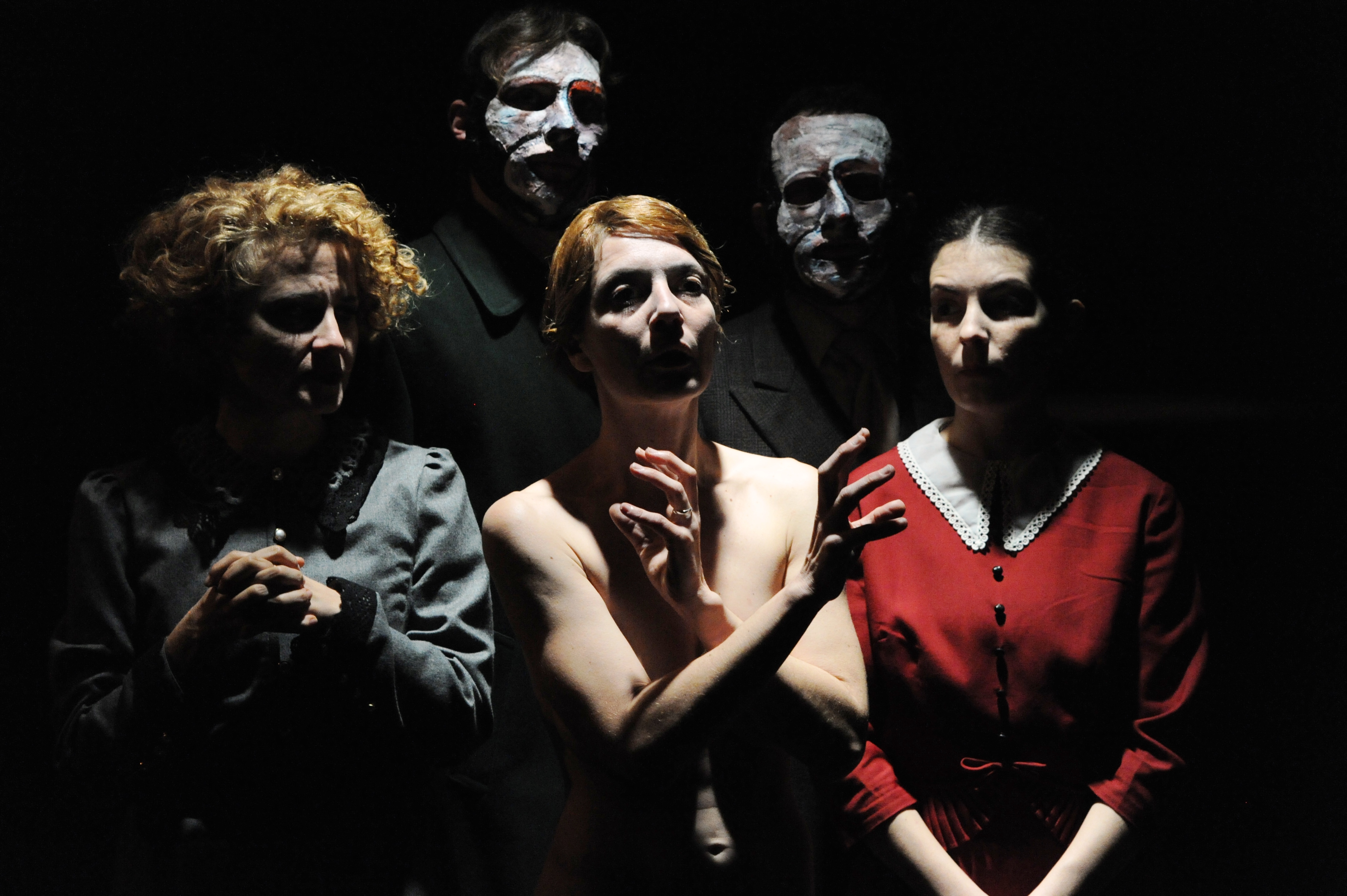Description
METAMORPHOSIS by Franz Kafka
Directed by Tasos Sagris
Starring
Sissy Doutsiou, Symeon Tsakiris, Stevi Fortoma, Loukia Anagnou, Thomas Havianidis.
Music
Whodoes. Radiohead. Arvo Part. Einsturzende Neubauten. Jani Christou. Godspeed You Black Emperor. Max Richter
Lighting
George Papandrikopoulos
Video art
Alkistis Kafetzis, Kipseli Film Coop, Void Optical Art Laboratory, Miltos Arvanitakis
Mask Construction
Koralia Krikelli
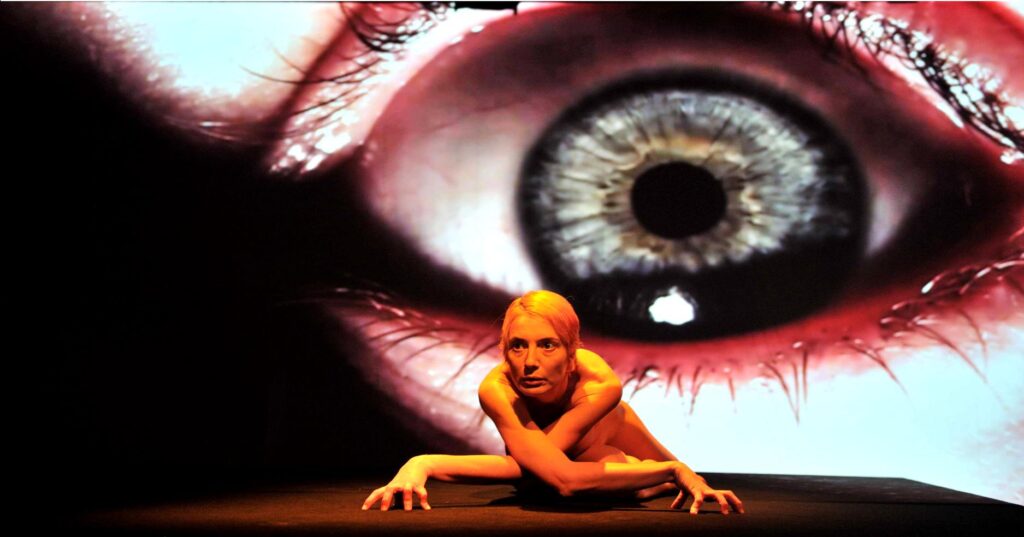
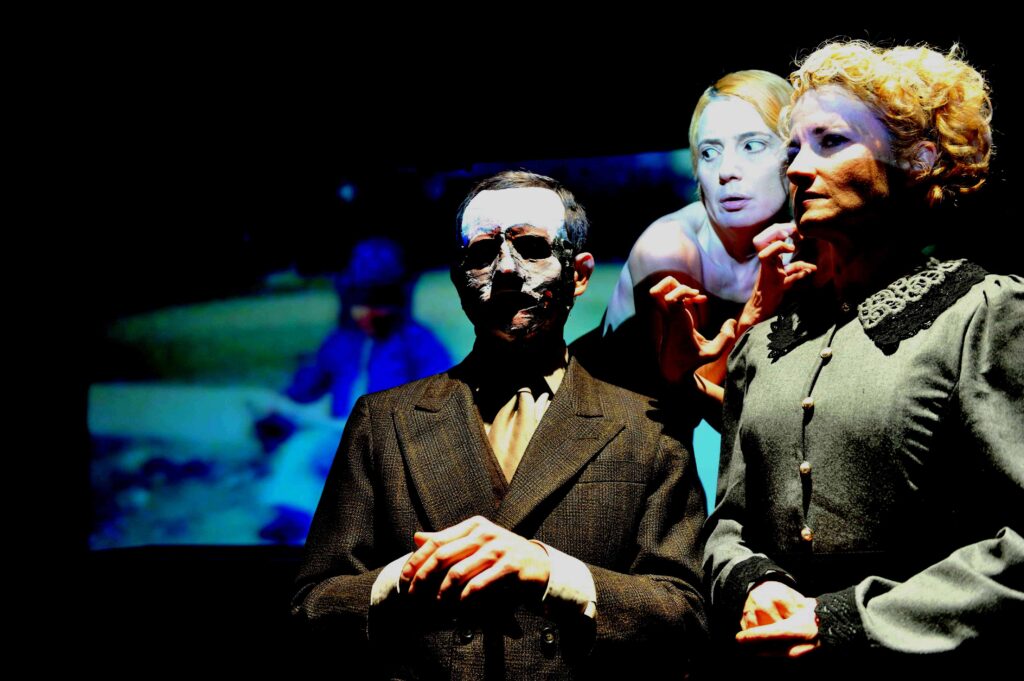
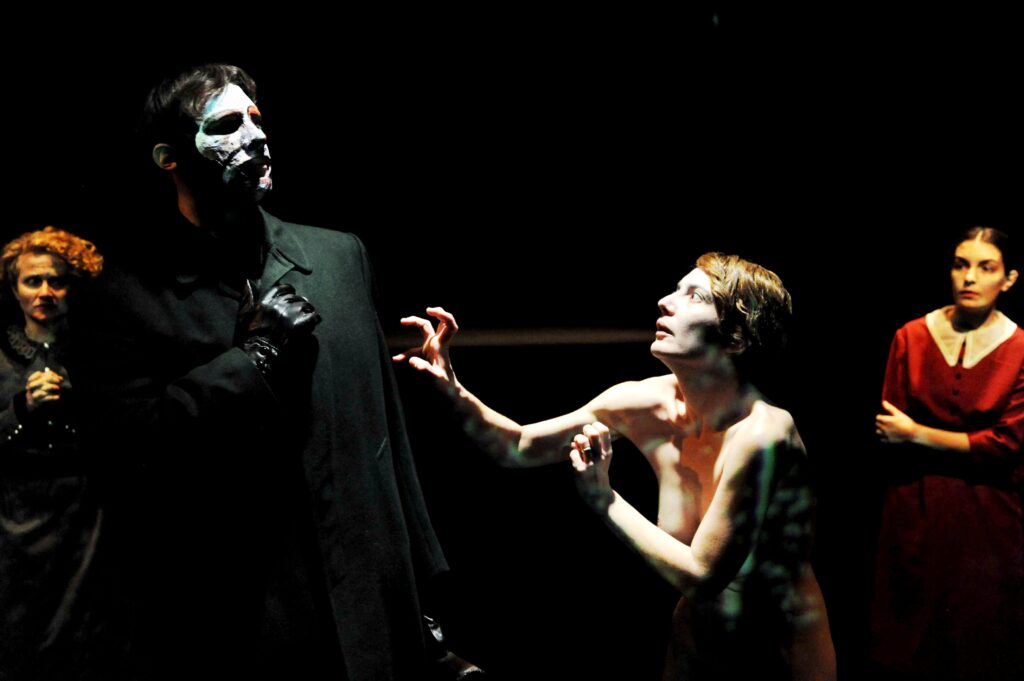
A cinematic documentation of one of the 20th century’s literary masterpieces—Metamorphosis by Franz Kafka—adapted for the stage and directed by Tasos Sagris. After a five-year run (2020–2025) in leading Greek theatres, this groundbreaking production arrives in its filmic form.
Critically acclaimed actress Sissy Doutsiou makes history as the first woman to portray Gregor Samsa, in a performance described as transformative and deeply unsettling.
Officially supported by the Franz Kafka Society in Prague, which hailed the show as “one of the finest theatrical adaptations of a Kafka work in history.” Produced by The Institute for Experimental Arts, with support from the Cultural Centre of the Czech Republic in Athens.
Franz Kafka is one of the greatest enigmas of the 20th century. Closed to himself, he studied all possible selves, cut off from the world, understood the world more deeply than all other writers of his time, hidden from the eyes of the people, looked all the people in their eyes.



Kafka, an observer of the collapse, a screenwriter for silences and neurosis, an enemy of the totalitarian spirit, a photographer of a bloodbath, an anatomist of Power, stands on the side of the outcasts of this world, those who have been deprived of the present and all that remains for them is nostalgia of the past and the hope for an unknown life hidden in a distant future.
The only way for us to be free is to be transformed. Kafka refuses to surrender, dares to look at the present as a trap and prove to us that what seems clean and healthy, in our world, is sick and dirty, and the solutions given to us for our problems are a trap, an invisible prison complicated all around us. Social life itself, which parasitizes on us, turns all those who try to resist and heal the wounds into wounded parasites of this world, deniers of the ruling class, destroyers of normality, monstrous cacophonies. Kafka calls us to rebuild the world that is collapsing within us. But to start this project, we must first to transform ourselves.
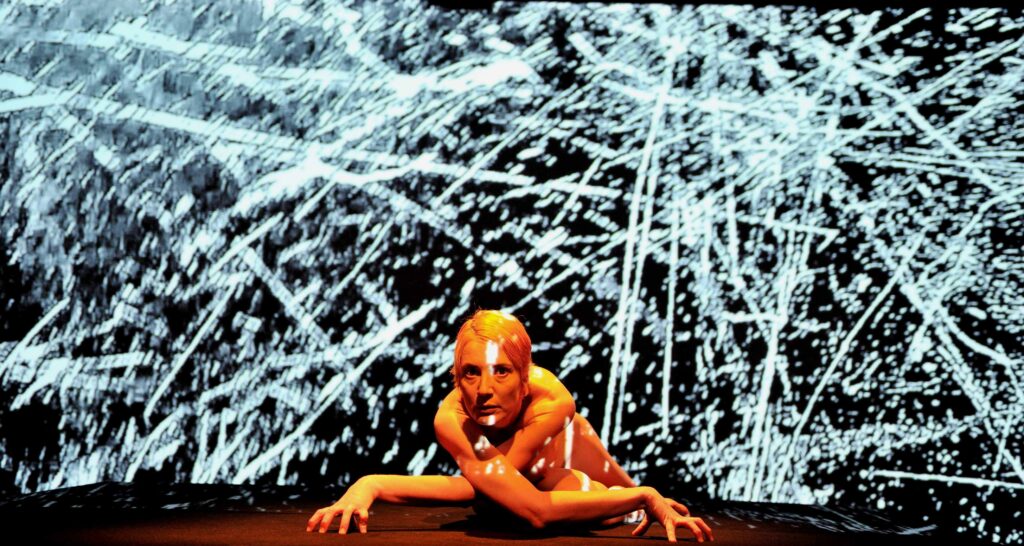

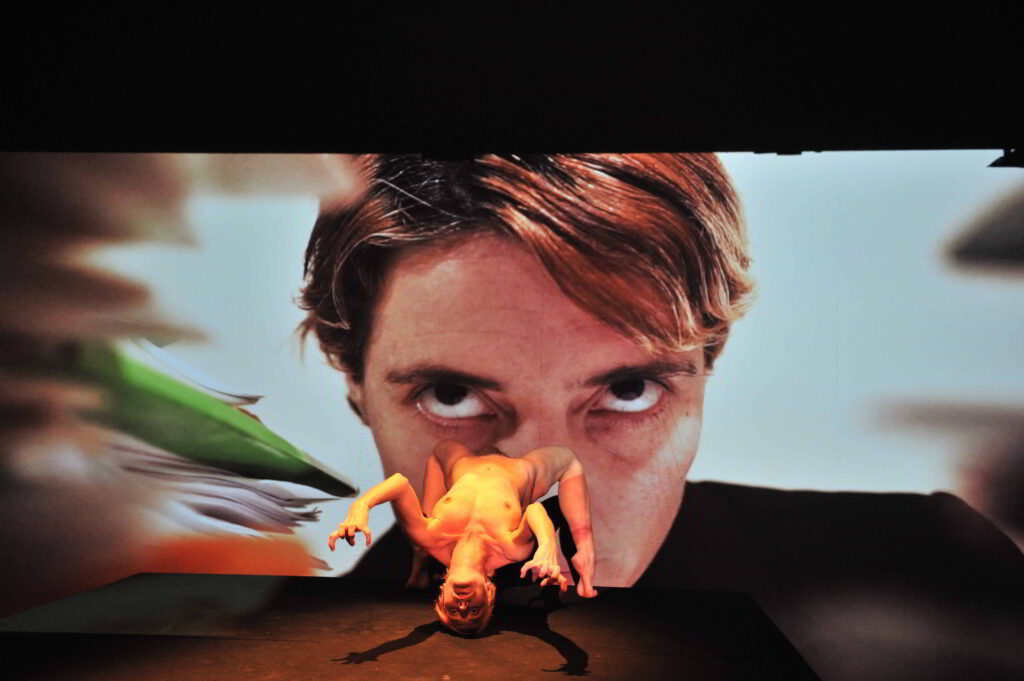
DIRECTORE’S NOTE
Continuing with The Institute for Experimental Arts the research on “in yer face” theater—with the theatre shows on Sarah Kane (4.48 Psychosis) and Rebecca Pritchard (Yard Gal), the study of the sacred Balinese theater and Japanese Butoh, the ideas of Antonin Artaud, the theater plays and anti-conformist way of thinking of Jean Genet—we choose to bring on stage one of the most important literary works of the 20th century, The Metamorphosis by Franz Kafka. In this way, we offer the public the opportunity to face the “radical evil,” the repetitive and unquestioning obedience to destructive norms and the way they reproduce a horrible world, a machine of destruction.
Repetitive movements and glimpses of ordinary life, icy faces, still objects, frozen moments, small details, close ups, cut ups, micro focus, cinematic language, fast, oversized stroboscopic video projections, seizures, a carousel of distorted memories, expressionistic light shows, sacred horror, a theater show for an audience with shut eyes. A supremacist, abstract, fragmentary theatrical setting, where objects and faces seem to explode and at the same time remain motionless like an old distorted photo of a big explosion.
An expressionistic theatrical act but not expressive, a very deep emotion that is suppressed, mechanisms of the neurosis that no form of psychoanalysis can understand. Nice, tender, lonely tragedies, the seasons that change and yet everything remains the same forever; until the moment of the inner explosion, until the transfiguration, until the Metamorphosis.



THE INSTITUTE FOR EXPERIMENTAL ARTS
An international platform for avant-garde theater, multimedia performance, spoken word poetry, visual art, and theory. Founded in 2008, the Institute has shaped contemporary theater with works like:
- The Maids (2011) by Jean Genet, echoing through social movements during economic crises with the cry: “Let’s not live as slaves.”
- I Die Like A Country (2012) by Dimitris Dimitriadis , documenting the collapse of a society.
- 4.48 Psychosis (2013–2015) by Sarah Kane, exploring the breakdown of identity.
- Night! (2017–2018) by Rebecca Prichard, delving into the hopes and violence of modern youth.



The METAMORPHOSIS by Franz Kafka comes to reveal the ruins of life hidden within us, to warn us that in this world, whoever cannot obey the orders is suddenly transformed into a parasite.
REVIEWS of the show in Greece
A Theatrical Ecstasy
Such an astonishing, literal transformation on stage—Dionysian, Maenadic, Bacchic—I had never witnessed until last Saturday, when I stood stunned before the exalted actress and poet Sissy Doutsiou. She portrayed the mythical insect—naked yet seemingly armoured in metal—while peeling away, one by one, the seven veils of Isis and dancing the frenzied dance of us all: the alienated workers who can no longer endure the charade, the waiting, the begging for money, for life itself.
We commit slow, everyday suicides—not like the romantic poet Karyotakis, with a bullet to the heart—but through a drawn-out agony. For others. But above all, for ourselves.
Yes. The show is that good!
While life outside smiles and the sun still shines, even into the deepest darkness of the soul. The Midnight Sun. The hymn of the initiated in the mysteries of Love and Death. A holy dread. Rarely do I find myself sighing deeply in a theatre seat. Rarely am I truly ecstatic. Most often I just shiver when something extraordinary—something that at first appears strange but is not—touches me.
Sissy Doutsiou is a phenomenon—self-destructive and meteoric, extreme and transitional. But she strikes the limbic. I first encountered her as a poet—passionate and relentless, excessive and unpredictable. An uncompromising yet deeply erotic lioness.
And now I witnessed a luminous, winged reptile rising from the base of her spine and crowning her head with seven cobra heads—one for each chakra of the awakened, furious kundalini. She is not a woman. She is a creator. A being reinventing herself within Kafka’s symbolic, restrained work—a work far more complex than we tend to believe.
Kafka is a poet—otherwise he could never inspire such a performance through his austere language.
This production is EXCELLENT. UNSURPASSED. UNIQUE.
It should be captured on film with three cameras, scene by scene, infinitely many times—so that this magnitude, this luminous force on stage, can be preserved. It dissolves everything and purifies everything.
This performance awakens "Mercy and Fear" in anyone who believes they’ve got life figured out—anyone comfortably settled in their thoughts, deluded into thinking everything is in order and no danger looms over their head. When, in truth, both within and around them, in this liquid universe, explosions erupt and lava pours every cosmic second.
This Metamorphosis was a theatrical climax—a transformation experienced with the complicity of the audience.
If the Institute for Experimental Arts can achieve this with Kafka, what else might they do? Perhaps with the musical and dramatized poetry of Sissy Doutsiou, or of some unknown poet, novelist, dramatist—what’s his name, what’s his name? What else will they create?
All I know is this: Tasos Sagris, through this production, has rewritten The Bacchae a hundredfold in modern tongues.
Maybe it’s time for just that as a next step?
I saw Metamorphosis, and I was entranced—and I mean it. I’m not easily moved, and I don’t praise lightly. Not even beauty.
But this... this was beyond. Excellent.
We bowed in admiration to the 'Metamorphosis' of Tasos Sagris
The press release praises the well-known work of Franz Kafka, analyzes its deep meanings, attempts to reduce to universal existential angles, conveys in words the author's intellect, but for the performance itself as dramatization of the above... almost a word! And you wonder if it's from modesty or weakness... and somehow "clap" not knowing what you're going to meet on stage, since Kafka's "psychological anatomy" plays are not the easiest for theatrical transfer. You go with modest expectations, knowing that the lure of the previous success in Athens, is very often fake... and just on this reservation and "misery" comes and finds you... the Miracle! And you enjoy it doubly, as all the viewers in the packed until inseparable Avlea Theater in Thessaloniki, for the performance "The Metamorphosis" of Franz Kafka directed by Tasos Sagris...
According to the case, a young employee who works conscientiously without any interruption for years in a company, supporting financially with her job exclusively this whole family after her father's accident, suddenly one morning she fails to get out of bed... her body refuses to follow the fixed, planned procedures of years, while at the same time she feels "something" on her and inside her to change dramatically... occupy her tyrannical fantasies and sees her body at other times as a "big wound" and at other times as "an insect with thousands of feet that do not know where to go"... no longer able to obey pleas and orders from parents, sister or supervisor to return to her (convenient for all) normality, isolates ignorant and impoverished in her own world by emitting and collecting from everyone animosity, as they now treat her as a useless parasite that does not offer anything and must be eliminated...
What should we say now about Kafka's masterpiece, which adorns world literature as a rare gem, alongside his other works? These works come from one of the brightest minds of the 20th century. Millions of readers have spoken, and its enviable position in libraries around the world is well-earned. Special analysts praise it for its high-level intellectualism, deep existential meanings, masterful writing, and impressive psychograms that "dissect" the human soul with few others displaying such precision. Kafka firmly chooses to focus on the "weak losers"—those whose conditions slowly disintegrate, mercilessly and silently, leading them toward paranoia. They either succumb to it or experience a "metamorphosis" in order to survive in a non-human world. This is epitomized in the tragic heroine, Gregor, who follows the rules, proves herself useful to others, and earns their acceptance while ignoring even her own people in the heavy mental cost she pays. Once her endurance is exhausted, and the terms change, the former standard becomes a pest with a detrimental presence. To avoid any misinterpretation, the word "diamond" applies in every sense—it says it all.
However, if the diamond for the play was known, that of the director by Tassos Sagris was a revelation! And we realized that a) finally out of modesty did not "praise" as he deserved his outstanding creation in promoting the show, when others for nothing are raving unsubstantiated hymns, and b) the previous success in Athens for this particular show is definitely true based on tangible "evidence"! Why is it impossible not to capture you, even occasionally shocking, such a strong performance with a masterpiece text that has been successful in accepting a great inspired direction given the difficult task... With a concentrated, targeted, accurate, meticulous, imaginative, modern director, who managed in just one hour to deliver all the inner power of the play, without missing or having any spare!
Tasos Sagris deserves great credit for his wisely thought-out choices and his mastery in combining extraordinary realism and fantasy. He blends elements of the past with flashes of the present, film optics with impeccable video, and live dramatization. The performance reaches ideal summits and intensities, while also incorporating comforting pauses. The evocative dark atmosphere, with excellent illuminations, and the icy mechanical movements of the surrounding environment, contribute to the explosive feeling throughout. The simple symbolic setting and the exquisite music, with continuous diversity that we could not have imagined, not only kept our interest completely engaged throughout the scenes but also conveyed, in the most modern, inspiring, and direct way, the deep spirit of a timeless human tragedy about submission and the attempt to disengage. As for the choice of the naked body for the heroine, it is one of the rare cases of absolute aptitude, to the point that you cannot imagine the role "dressed", it would be completely false...
And coming to the interpretations, it goes without saying that we will start with a great blessing to Sissy Doutsiou as the central heroine Gregory for her spectacular feat, essentially lifting to her bare backs the main burden of the show... as her interpretation, apart from mental testimony, tragedy, emotion, internal conflicts, paranoia, involved intense physical stress, while the impressive kinesiology of "insect" or "convulsions" throughout caused sincere admiration (and plenty of applause) for her great professionalism, absolutely convincing in a difficult role - challenge... Simeon Tsakiris, Loukia Anagnou, Thomas Havianidis, in the wonderfully structured roles of the guilt mother, the callous father, the loving sister with the unpredictable conversion, the authoritarian head, with excellent directorial guidance in frozen rigid kinesiology and mechanical expression of speech without any exaggeration, as representatives of a cold power establishment with clear symbolism, referred to by the "hard" masks - men's faces... In conclusion (=) I find if something was missing or missing or bothered or could be better and despite the... (known to pervert) "lice", I do not find... After all the spontaneous sense of fullness leaving, after prolonged applause of viewers who for an hour did not salute even head, never falsified and is the most irrefutable witness that theatrical art performed its high work in full!
The ailing body of man- Kafka's Metamorphosis
The central theme of Kafka's writing and the "cross" of his torment is the elusive and inconceivable present, in the context of our modern civilization, idea of the universal Law, which ought to run the world without trial - divides, like the divisive Law established by the Romans. Kafka, himself a lawyer, had been struggling throughout his life to break the shell of this Law which fell into a tool of oppressing the weak from the strong. This is something his abstract, sterile social and political interpretations deliberately hide.
How contemporary Kafka is and how prophetic, and how slightly metaphysical, we find in each text. In "Colony of the punished" e.g. it describes the torture of a convict without trial. In this short story the “judge”, torturer and executioner at the same time, willingly substitutes the victim and takes his place at the end of the day, with the necessary condition that the execution meets the requirements of a public matter to the pity of the unbelievers. The desire of the father's murder, we could say here, at a first Freudian reading, repels as a feeling of guilt in the theater of the unconscious, and seeks punishment. Or at a second reading we could invoke Nietzsche's famous position on Judaism.
According to this, the mono and wealthy people of the Bible chose for survival purposes in the hostile world the privileged role of the chosen victim of a terrible living legislator - father - God, who tests his faith and saves him at the last moment. The most famous example is the sacrifice of Abraham, with a happy ending, and less known the sacrifice of his daughter Jephthah with a not happy ending. (It was a girl, see!)
Kafka, a Diaspora Jew divided between two languages, two cultures and two religions, with the syndrome of exclusion by both. We know this today, from the book published only in 1968 by his young friend and “student”, then seventeen-year-old Janusz Gustav, “Chatting with Kafka.” Where he faithfully records all their conversations and transfers us from “first hand” his ideas and thoughts.
Kafka's cracked humanism is not like the slow Western pharisaic, which spreads his own blood and always spills the blood of others. It's got a root that's constantly bleeding. The nucleus of Kafka's scriptures is the ailing body of the crucified man.
In "Metamorphosis", an employee, after ten years of continuous repetition of the same constant daily schedule, suddenly one morning fails to get out of bed. He has been transformed into a huge disgusting beetle, yet he is conscious of his condition, a "monster" for others, which causes terror and disgust even in his own family.
The performance of "Metamorphosis", by the "Institute of Experimental Arts" in "Ex-Machina Theater" in Athens, directed by Tasos Sagris, sees behind the Kafkian parable the truth and removes the allegorical cococoon of the hero's transformation into an insect, to realistically highlight the constantly tortured, and crucified by the powers and the Law in the service of the powerful, suffering naked body of man, regardless of nation, race, color or gender. Yet, and in his utter humiliation, he still remains human. A directorial choice I applaud.
Sissy Doutsiou, in the leading role, gives a real recital of total physical approach to the suffering and crucified man, reaching the limits of hypocritical self-sacrifice, not hesitating even to "crumple" herself. A dance of family and other “monsters”, with the following, is perfectly moved around her: Stevi Fortoma, Mano Chizek, Loukia Anagnou, Thomas Chavianidis.
The sets and costumes are appropriate, the music itself (Whodoes) and the evocative lighting (George Papandrikopoulos).
Franz Kafka's Metamorphosis is a brilliant allegorical conception, rich in symbolism, which makes it both timeless and tragically topical. The author outlines the personal, familial, and social wounds inflicted by the Western, capitalist way of life on man, the absurdity of power, and the norms of discipline and punishment imposed on everything that is considered "abnormal."
Everything in this novel is deafening and blatant. This is the "strange" story of Gregor Samsa, a young employee who wakes up one morning to find himself transformed into a beetle. Suddenly, he is unable to get out of bed and prepare for work. Initially, he faces this repulsive change as a result of the tiresome and dead-end routine he has followed for the past ten years, with no personal life to speak of. He has shouldered the financial burdens of his family while still living as a human.
Now, he is helpless and "useless" both to his family and society. He feels alone, isolated, weakened, psychosomatically hurt, and experiences rejection and abuse from those he loves. In the family "wound," another layer is added: the rejection he faces from his family after his transformation. They are utterly repulsed by his appearance, completely disgusted by his form, and view him as a lost cause.
Human instrumentalization, lack of individual freedom, apathy, violent behavior, exploitation of the powerless by the strong, confinement, loneliness, and mental deterioration are some of the unpleasant truths that emerge from the work.
Through the metaphor, man's attempt to free himself from the heavy burden of responsibility and escape his involuntary prison seems possible, but eventually vanishes, almost entirely wiped out. Because when one ceases to be useful and productive, one is considered waste in every sphere. And concepts like love, care, respect, empathy, and solidarity are no longer taken for granted. Everyone turns their back on anything that deviates from "regularity."
Director Tasos Sagris immediately introduces us into the Kafkian universe with a cinematic aesthetic from the very first rhythm. The intense visuals (Alkistis Kafetzis, Kipseli Film Coop, Void Optical Art Laboratory, Miltos Arvanitakis) and the deafening music of Whodoes decisively contribute to an intense rhythm, where fear, anguish, terror, and surprise are the audience's "ticket" to a theatrical experience lasting only 65 minutes. Heterogeneous movements coexist and communicate. Bodies, pulsating and subdued in the language of Kafka, are illuminated with precision by George Papandrikopoulos, marking their actions. It is an existential journey, with diabolical accuracy, dramaturgical intelligence, and profound knowledge that shocks and elevates the dramatization. The artistic magic is palpable, bringing out the essence of an allegorical work in a direct and condensed manner, without resorting to easy impressions.
We are also intrigued by the fact that the protagonist is female, an easy victim and prey on the altar of patriarchal and capitalist rule. A power that is distinctly imprinted behind the masks worn by the unique male oppressors in the project.
Five performances support and justify the director's intentions in a well-structured performance from beginning to end. All five actors are austere, with no outbursts or pompous expressions, and their speech and movement are in complete harmony.
Sissy Doutsiou, in the leading role, delivers an apocalyptic performance, emitting truth, soul power, and apostolic honesty in a portrayal that conveys deep misery.
Simeon Tsakiris, with hypocritical precision, plays the hard and rigorous "Father" who kills what stands in the way of his personal "regularity" every day.
Stevi Fortoma bears, in part, the tragic burden of the "Mother" and moves with subtle grace.
Thomas Chavianidis embodies the relentless “Head” behind the façade of unscrupulous power, the absolut Manager with no trace of empathy or understanding.
Loukia Anagnou paints the "Sister," making her an "uncomfortable" figure in the story, who too, unwittingly, submits to her fate.
Kafka aptly places the irrational element within the realism of everyday life and creates his own version of reality. He leads the characters, gradually, to complete collapse, leaving all their wounds open. We will have our own wounds. For Metamorphosis provides the ultimate hope of escape from the prison in which man has condemned himself. And the performance at the sold out, historical "PORTA" theater in Athens will haunt us for a long time.

